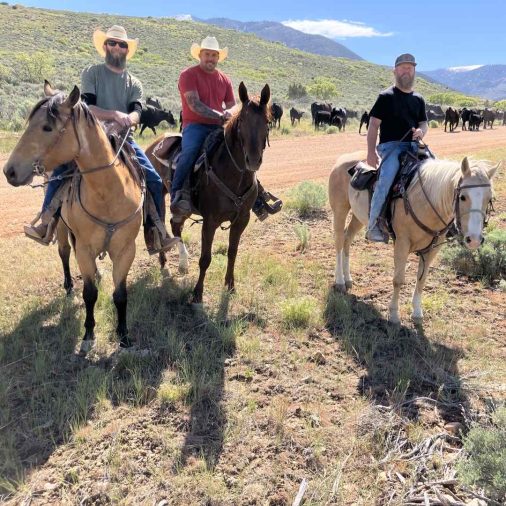Painkiller Addiction Treatment Utah
What To Know About Painkiller Addiction
Painkiller addiction occurs when individuals develop a physical and psychological dependence on prescription medications meant to treat pain. Drugs like morphine, codeine, or fentanyl can significantly impact brain function, leading to tolerance, cravings, and withdrawal.
Taking larger doses or using without medical guidance often leads to serious consequences, including overdose, organ damage, mental health decline, and strained relationships.
At Mountain Valley Recovery, we help men break free from this cycle with targeted, life-changing treatment in a supportive environment.
EXCELLENTTrustindex verifies that the original source of the review is Google. After several rehabs, and we mean several, our son recently hit the 1 year sober mark. We have our son back and are so grateful. Changing patterns, building healthy habits, developing a good work ethic and finding enjoyment in working, finding confidence, becoming responsible, developing good daily patterns, building good friendships, finding a place in the community,… takes time. Kellie and other staff members at Mountain Valley understand that and do a great job of supporting and guiding the residents in their daily walk. They build friendships with the residents. They show them respect and acceptance and recognize their great potential. They help them recognize that potential by giving them those daily opportunities to work, grow, contribute,… The therapists, also a key part of the program, are excellent. The community is also welcoming, kind, supportive, accepting,… and show friendship. Mountain Valley is what a recovery program truly needs to be in helping residents build a healthy lifestyle pattern. Thank you Kellie and the rest of the staff. So grateful to have our son back. We highly recommend Mountain Valley!!!Trustindex verifies that the original source of the review is Google. It’s hard to accurately put into words how amazing I think Mountain Valley Recovery is….. But I’m going to do my best. I have spent most of my adult life going from one treatment center to the next and from jail to jail. I have put my heart into recovery before and attended other treatment centers but in the end when I left treatment there were to many things missing and inevitably I relapsed. I was lacking good long term habits. I hadn’t built a work ethic because in all my previous treatment centers we just did therapy or rec therapy all day! Also there several other things that are essential for a fulfilling life that other treatment centers just couldn’t offer. I believe Mountain Valley has beautifully and elegantly found the solution for the deficiencies found in other programs. It is long term and allows you to build healthy habits that are permanent. They offer work with amazing caring people in the community. They offer weekly equine therapy. There are cows and horses on the premises that can be interacted with daily. They offer top notch therapy with excellent therapists. They offer recreational activities from skiing to cabin trips. The staff is compassionate, competent and invested in the success of their residents. They offer independence and responsibility. They allow you to save money and chart your own path with excellent support and guidance to make sure you are where you want to be when you graduate. It is a small town and everybody in the community is 100% behind all the residents. Most of all they offer all there residents a new home. By the time you graduate you feel such a part of the community that it seems almost impossible to leave. And if you to stay after graduation. They are right there to help you stay and put roots down In the community. It is not an easy program but every graduate I have met lead happy stable lives and are forever a part of the community. And for someone who hasn’t felt like I had a real home for a long time that is priceless. I would absolutely encourage anyone to consider what they want long term and understand that most of those things can’t be found in your typical rehabs. If you are ready to change and want to have the best chance of having a fulfilling life that you love. No other rehab can offer you more the Mountain Valley. I have found a home here in Holden, Utah of all places and I don’t see myself leaving anytime soon.Trustindex verifies that the original source of the review is Google. This is a wonderful and well rounded treatment program. The staff is wonderful and the facilities are great. Beautiful setting away from town with farm and animals. I highly recommend Mountain Valley RecoveryTrustindex verifies that the original source of the review is Google. Mountain Valley truly changed our family member's life from darkness to light. His life was a total mess & he was depressed. Now he's thriving in a new job & has an amazing positive attitude. Excellent staff & community support.Trustindex verifies that the original source of the review is Google. After multiple attempts at other rehabs and other avenues, we found Mountain Valley Recovery. We were cautiously optimistic when we sent our son here since we’d been disappointed in the outcome so many times before but after completing their 9 month program, he is clean, sober and will tell you that he’s way happier than he’s ever been or ever thought he could be! The way in which they run this program is perfect. Getting in touch with nature, learning how to be a ranch hand, group and individual therapy, finding faith in God, being taught numerous career skills, going camping and on tons of fun adventures are just a few of the many wonderful things that make MVR the most well-rounded and successful recovery program we’ve been able to find. We will never be able to thank Judd, Kellie, Chet and Joseph enough for all they’ve done for our son. He is a changed man. We highly, highly recommend Mountain Valley Recovery!Trustindex verifies that the original source of the review is Google. This place will get you where you want to be in life. MVR is a lifesaver. It is a very good tough program but this is the type of program that actually works. No one ever said it would be easy, it’s just worth it! Everything is one day at a time here. They build you up to become a part of society again. All of the employees at MVR are selfless and want nothing but the best for their clients. This place will not only get you sober, it will give you your life back. I wouldn’t recommend any other place to anyone. Judd and Kelly are so caring and will welcome you to their family the second they meet you.if you like therapy from horseback, 11,000 feet up in the mountains then this is the place for you! You will go on unbelievable adventures with Chet and other clients. Chet is an amazing therapist! This place is worth it! God bless!Trustindex verifies that the original source of the review is Google. I’ve spent the last year at MVR and words can’t express how grateful I am to everyone at the ranch. There are so many things that set mountain valley apart from other places it’s like no other recovery program ive ever been to. It’s changed my life and I feel blessed to have been able to build such a huge structure of fantastic people that I consider family. Much loveTrustindex verifies that the original source of the review is Google. Words and stars are not enough to convey how truly grateful our family is for the lifesaving and life-changing experiences our son had during his time at MVR. I can think of no better environment for someone to begin the difficult process of healing from the physical, emotional, and spiritual wounds of addiction. The support our son received from the owners, staff, and members of the local community was amazing. They truly care about the men who enter the program. If anyone reading this is struggling with addiction or has a family member struggling with addiction, I wholeheartedly encourage you contact Mountain Valley Recovery.Trustindex verifies that the original source of the review is Google. If I could give more stars, I would. My family and I are so grateful for the opportunity you gave my son to be his best self. I cannot thank you, the staff and community enough for everything you’ve given him. No doubts at all about how much you all truly care about the men who come to stay at the Ranch…. It’s life changing!Trustindex verifies that the original source of the review is Google. This program is not for the faint of heart. It is difficult, however you get out what you put into it. I was in bad shape when I got there. They were kind enough to accommodate my health issues I had when I arrived, other programs turned me down. The longer I was sober the better my health got. I'm now once again a contributing member of society with a year sober.
Common Painkiller Addiction Symptoms
Addiction to painkillers can affect every part of a person’s life – physically, emotionally, and socially. It often develops gradually, making it easy to overlook until it becomes a serious issue.
Common symptoms of painkiller abuse may include:
- Frequent cravings or obsessive thoughts about the drug
- Increased dosage without medical advice
- Using painkillers to cope with stress or emotions
- Loss of interest in hobbies or daily activities
- Changes in behavior, sleep, or appetite
- Hiding drug use or lying about prescriptions
- Isolation from loved ones
- Physical symptoms like nausea, sweating, or fatigue when not using
Each of these signs points to a deeper issue that requires professional support – Mountain Valley Recovery is here to help.
What to Expect in Our Inpatient Treatment for Painkiller Addiction
At Mountain Valley Recovery, our painkiller rehab program provides a structured, immersive experience designed to support long-term recovery for men battling painkiller dependency.
- Rehabilitation: We use a comprehensive approach that includes individual and group therapy, cognitive behavioral therapy (CBT), and family counseling. Our team also addresses any co-occurring mental health conditions and helps clients rebuild damaged relationships.
- Treatment Duration: Each client’s experience is personalized, with our Long-Term Residential Treatment Program offering the time and resources needed to achieve lasting change.
- Holistic Approaches: Our treatment includes Vocational Programs, Recreation Programs, Faith-Based Programs, and other holistic services to support healing of the mind, body, and spirit.
- Aftercare & Relapse Prevention: Our program includes ongoing relapse prevention planning, post-treatment support, and tools to manage withdrawal symptoms and rebuild a healthy life.
Our Approach to Painkiller Addiction Treatment
At Mountain Valley Recovery, we offer a men-only painkiller treatment program rooted in accountability and growth. Set on a working ranch in Utah, our approach blends evidence-based therapy with real-world skill-building.
Through personalized care, mentorship, and hands-on experiences, we help men regain confidence, embrace self-reliance, and build a strong foundation for lasting recovery.
FAQ About Our Painkiller Addiction Treatment
How long does painkiller recovery take?
The recovery timeline varies for each individual. Some may make progress in a few weeks, while others benefit from several months in our long-term treatment program. We customize each plan based on personal history, addiction severity, and co-occurring issues. Recovery is not a race – it’s a life-changing journey.
Is it possible to recover from painkiller addiction after a relapse?
Absolutely. Relapse is a common part of the recovery journey and can provide valuable insight into what strategies need improvement. We help clients understand their relapse triggers and develop stronger coping tools for future success.
How Long Does Painkiller Withdrawal Last?
The duration of painkiller withdrawal varies based on the type of drug, length of use, and individual health. Critical symptoms typically begin within 6–12 hours of the last dose and can last up to a week. However, some individuals experience post-acute withdrawal symptoms (PAWS) like anxiety, insomnia, or mood swings for weeks or even months. At Mountain Valley Recovery, we offer clinical support to manage both short- and long-term symptoms safely.
What are the long-term risks of untreated painkiller addiction?
Untreated painkiller addiction can lead to severe physical, emotional, and social consequences. Long-term risks include liver and kidney damage, respiratory depression, increased risk of overdose, and heightened mental health issues such as anxiety and depression. Many individuals also face job loss, damaged relationships, and legal trouble. Early intervention and treatment significantly reduce these risks.
How can I support a loved one who is recovering from painkiller addiction?
Supporting a loved one in recovery involves patience, understanding, and encouragement. We offer family counseling to help loved ones understand addiction and develop healthy ways to support their family member through recovery. Communication, empathy, and participation in the recovery process can significantly improve their chances of long-term success.
Substance Abuse Treatment Programs
Alcohol Addiction Treatment
Alcohol recovery starts today. With our personalized treatment and support, you can rebuild your life and embrace a healthier tomorrow.
Heroin Addiction Treatment
Heroin addiction can feel overwhelming, but recovery is possible. With our expert care, you can heal, rebuild, and reclaim your future.
Fentanyl Addiction Treatment
Fentanyl addiction can be overcome with the right support. Our evidence-based treatments help you break free and regain your strength.
Cocaine Addiction Treatment
Cocaine recovery starts with one step. With our expert care and support, you can break free and create a future full of possibilities.
Meth Addiction Treatment
Meth dependence doesn’t have to hold you back. Our evidence-based treatments help you rebuild a healthy, thriving future.
Opioids Addiction Treatment
Opioid recovery opens the door to a new beginning. Let us help you leave addiction behind and embrace a brighter future.
Xanax Addiction Treatment
Overcoming Xanax addiction is possible. Let our team help you regain your mental clarity and take back control of your future.
Amphetamine Addiction Treatment
Overcoming amphetamine addiction is possible. Let our team support you in restoring clarity and taking back control of your future.
Hallucinogens Addiction Treatment
Breaking free from hallucinogen addiction is possible. Our team is here to help you regain clarity and reclaim control of your future.
Ativan Addiction Treatment
Overcoming ativan addiction is within reach. Let our team help you find clarity, stability, and regain control of your future.
LSD Addiction Treatment
Benzodiazepine Addiction Treatment
MDMA Addiction Treatment
With the right support, MDMA addiction can be overcome. Our evidence-based treatments empower you to heal and reclaim your life.
PCP Addiction Treatment
Adderall Addiction Treatment
Adderall addiction doesn’t have to define your future. Our comprehensive treatment supports lasting recovery and personal growth.
Valium Addiction Treatment
Codeine Addiction Treatment
There’s life beyond Codeine addiction. With compassionate care and proven methods, we help you heal, grow, and take back control.
Morphine Addiction Treatment
Break free from Morphine addiction. Our compassionate team guides you toward recovery, growth, and a renewed sense of purpose.
Marijuana Addiction Treatment
Inhalant Addiction Treatment
Conquer Inhalant addiction. Our supportive team helps you rebuild, recover, and reclaim a healthier, more fulfilling life.
Painkiller Addiction Treatment
Percocet Addiction Treatment
Percocet addiction doesn’t have to control your future. Our tailored care supports lasting recovery and meaningful growth.
OxyContin Addiction Treatment
Kratom Addiction Treatment
K2 and Spice Addiction Treatment
Xylazine Addiction Treatment
CNS Depressants Addiction Treatment
Ketamine Addiction Treatment
Steroid Addiction Treatment
Galaxy Gas Addiction Treatment
Opiate Addiction Treatment







